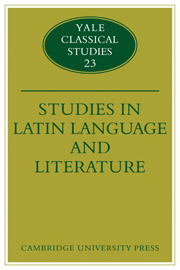Book contents
- Frontmatter
- Contents
- Tribute to Clarence Whittlesey Mendell
- Particularum quarundam varietas: prae and pro
- Greek poetry in Cicero's prose writing
- A new look at the manuscript tradition of Catullus
- Towards a fresh interpretation of Horace Carm. iii. 1
- Tibullus: Elegy 1. 3
- Notes on Livy ix
- Structure and meaning in the prologues of Tacitus
- The Tacitean Germanicus
- Juvenal's ‘Patchwork’ satires: 4 and 7
Tibullus: Elegy 1. 3
Published online by Cambridge University Press: 10 January 2011
- Frontmatter
- Contents
- Tribute to Clarence Whittlesey Mendell
- Particularum quarundam varietas: prae and pro
- Greek poetry in Cicero's prose writing
- A new look at the manuscript tradition of Catullus
- Towards a fresh interpretation of Horace Carm. iii. 1
- Tibullus: Elegy 1. 3
- Notes on Livy ix
- Structure and meaning in the prologues of Tacitus
- The Tacitean Germanicus
- Juvenal's ‘Patchwork’ satires: 4 and 7
Summary
One of the most frequent errors made by critics who would defend Tibullus' poetry is the acceptance of the very standards of judgement which led earlier critics to attack it. Because they continue to ask the same, wrong questions about a poem, they should not be surprised to arrive at the same, wrong answers. The resulting conflict between an intuitive admiration for Tibullus and a negative judgement based upon the observation of apparent flaws has led even his staunchest defenders to make statements like the following:
La malchance de notre poète, c'est que, chez lui, les imperfections apparaissent au premier regard, alors qu'il faut quelque examen pour discerner les perfections.
The price of such disciplined artistry may be a lack of depth and internal movement, but the reward is lucidity and harmony of emotional colours.
Even a lenient judge must conclude that perfections which are concealed from the average reader by a host of flaws, or technique so refined that it produces shallow and static poetry can hardly be characteristic of a first-rate poet. Yet Quintilian names Tibullus first of the elegists, and we are loath to disagree.
One example of a critic asking the wrong question is Elder, when he discusses Tibullus' methods of achieving unity in his poems. This discussion should be viewed against a backdrop of those critics who called Tibullus an Ideenflüchtiger or saw only loose connections between the ‘episodes’ of a poem.
- Type
- Chapter
- Information
- Studies in Latin Language and Literature , pp. 147 - 158Publisher: Cambridge University PressPrint publication year: 1973



